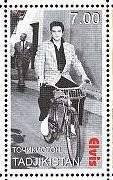
Artist: Leòn Gieco
Song: El Angel De La Bicicleta
Album: Por Favor, Perdon y Gracias (2005)
Raúl Alberto Antonio Gieco, better known as León Gieco (born on November 20, 1951 on a farm near Cañada Rosquín in northern Santa Fe, Argentina) is a pop-folk music composer and interpreter. He is known for mixing popular folkloric genres with Argentine rock, and for lyrics with social and political connotations. This has led to him being called "the Argentine Bob Dylan".
Leon Gieco, ever since his appearance in Argentina's Rock and Folk scene over thirty years, has managed to sing about the injustices he witnessed without compromising the beauty of his melodies. His passion for bringing together the sounds of popular music -whether it was American Rock or the zambas and chamames of his own country- and tell meaningful stories as well, has grown, sharpened its message and give his songs an unmistakable and powerful voice.
"Por Favor, Adios, Gracias," his new album, is a gorgeous sum of what I'd call Gieco's "dance of beauty and social conscience," where both elements shine in their own right without deeming each other's light.
To start us off, "Yo Soy Juan" offers a fierce Rock riff to the story of a young man who had found out that his real parents were political activists kidnapped and tortured at the time his mother was pregnant, and that he was given to a family once they were killed, something that happened in Argentina quite often during its "infamous decade" beginning in the mid-70's.
With this song, Gieco confirms that playing great music does not need to compromise the power of songs to wake people up or have them ponder on the world we get to live in. The same is clear in "El Angel De La Bicicleta" about a young man who dedicated his life to feed people living in the poorest area of one of Argentina's provinces, and was shot to death by the police. Or, his tribute to the late Third World priest Father Mugica -"Los Guardianes De Mugica"- who was killed in one of Buenos Aires shantytowns in the 70's.
The rest of the songs are just as beautiful -even those retelling tragedies are beautiful- and moving, listen to the melodies of "Ve A La Luna," "Solo Figuras," "Santa Tejerina," "Al Atardecer," or "Carneada," for further examples of Gieco's musical breadth. And if I don't mention any more is to attempt to keep an already long review from getting longer, rather than because the good tunes end there.
These are politically charged songs that never surrender their artistic value, message or music count and deserve attention. Think of Gieco as a disciple of Dylan's who mastered an uncompromising poetic vision, stay current to the music of his times and denounced history's dark side, at the same time.
Please, even if your Spanish is weak, give this album the opportunity to stun you with it power and tender call to remain open and sensitive to our beleaguered world.
About Pocho
Popular folk-rock composer León Gieco, well-known for his involvement in social causes, wrote a song dedicated to Lepratti, El ángel de la bicicleta ("The Angel of the Bicycle", alluding to Lepratti's main means of transportation). The video shows scenes of the December 2001 riots and the police repression, along with people writing graffiti about Lepratti. Such graffiti, most commonly the phrase Pocho vive ("Pocho lives"), the picture of an ant, or a winged silhouette (an angel) riding a bicycle, have sprung up in Rosario's walls, including the downtown.
(…) Su corte de difusión fue El ángel de la bicicleta, tema dedicado a Claudio Pocho Lepratti, un joven de 35 años que vivía en el barrio Ludueña de Rosario (provincia de Santa Fe), trabajaba en una escuelita de bajos recursos del empobrecido sur de la ciudad, colaborando con un comedor infantil. En diciembre del 2001, en medio de la gravísima situación sociopolítica que vivía la Argentina, varios policías tirotearon el comedor, y Lepratti se asomó por la terraza para insultarlos y fue asesinado de un balazo en la garganta. Después de aquel asesinato, por las calles de Rosario se ven las pintadas con una bicicleta alada. Esta situación inspiraría la canción.
Cambiamos ojos por cielo
Sus palabras tan dulces, tan claras
Cambiamos por truenos
Sacamos cuerpo, pusimos alas
Y ahora vemos una bicicleta alada que viaja
Por las esquinas del barrio, por calles
Por las paredes de baños y cárceles
¡bajen las armas
Que aquí solo hay pibes comiendo!
Cambiamos fe por lágrimas
Con qué libro se educó esta bestia
Con saña y sin alma
Dejamos ir a un ángel
Y nos queda esta mierda
Que nos mata sin importarle
De dónde venimos, qué hacemos, qué pensamos
Si somos obreros, curas o médicos
¡bajen las armas
Que aquí solo hay pibes comiendo!
Cambiamos buenas por malas
Y al ángel de la bicicleta lo hicimos de lata
Felicidad por llanto
Ni la vida ni la muerte se rinden
Con sus cunas y sus cruces
Voy a cubrir tu lucha más que con flores
Voy a cuidar de tu bondad más que con plegarias
¡bajen las armas
Que aquí solo hay pibes comiendo!
Cambiamos ojos por cielo
Sus palabras tan dulces, tan claras
Cambiamos por truenos
Sacamos cuerpo, pusimos alas
Y ahora vemos una bicicleta alada que viaja
Por las esquinas del barrio, por calles
Por las paredes de baños y cárceles
¡bajen las armas
Que aquí solo hay pibes comiendo!
="385">





No comments:
Post a Comment